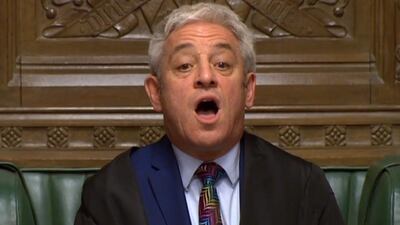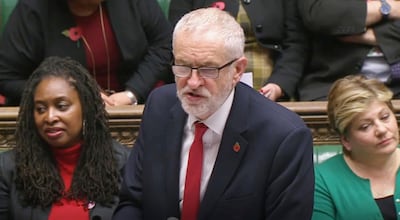Britons will vote in a snap general election on December 12 after the UK Parliament voted resoundingly in favour of the government’s proposal on Tuesday.
The Commons approved legislation paving the way for the first December election since 1923 by a margin of 438 votes to 20.
The motion is set to be debated in the House of Lords and is unlikely to be blocked.
It could become law by the end of the week and if so, there will be a five-week campaign leading up to polling day.
The date of the election was being debated by Parliament earlier on Tuesday.
The government wanted it to be on December 12 while opposition parties generally wanted the vote to be on December 9, because it would make it more likely that students would be able to vote.
Many universities break up for the Christmas holiday in the week of December 9 to 13.
The government won that vote by a majority of 20.
British Prime Minister Boris Johnson sought approval to hold a snap election through the Fixed-term Parliament Act on Monday, but failed to meet the required a two-thirds majority.
Labour, the main opposition party to Mr Johnson's ruling Conservatives, abstained from the vote.
The Liberal Democrats and the Scottish National Party voted down the proposal.
But earlier on Tuesday, opposition leader Jeremy Corbyn said he would back the government’s proposal for an early poll, after an extension to the Brexit deadline was approved by the EU until January 31.
After a shadow cabinet meeting earlier on Tuesday, Mr Corbyn said his MPs would support the government’s fourth bid for an early election.
He said Labour would launch the "most ambitious and radical campaign for real change our country has ever seen", now that a no-deal Brexit was "off the table".
Former Conservative chancellor Philip Hammond, now a perennial thorn in the side of the government as a backbench MP, spoke out against postponing the passage of the withdrawal agreement for an election.
“The idea now that we would halt all this and have a general election frankly appals me," he told the BBC earlier on Tuesday.
"I think the government is trying to create a narrative that Parliament is blocking Brexit and therefore we need an election.
“But that is simply untrue. Parliament signalled very clearly last week that it was prepared to press on with the Brexit bill, provided it has a reasonable timetable to do so."
Mr Corbyn on Tuesday said he would back election votes for those aged 16 and 17, and EU citizens with settled status.
But deputy speaker Lindsay Hoyle did not pick either for debate. Downing St said it would have pulled its election push if they were selected for debate.
Many pro-Brexit MPs in his own party have baulked at Mr Johnson’s plans to freeze his Brexit bill as he attempts to win over the opposition.
Those furthest on the right wing of the Conservatives fear being outflanked by Nigel Farage’s Brexit Party if they were unable to secure Britain’s withdrawal before an election.
Many Labour MPs also remain opposed to an election, because of the Conservative’s strong polling numbers and public confusion over Mr Corbyn’s policy of negotiating a Brexit deal while also promising a second referendum.
Many commentators consider the election to be a gamble for the government. It is already regarded as one of the most unpredictable votes in British history.
Recent polls show the Conservatives anywhere between 3 and 16 per cent ahead of the other parties.
On Monday the EU agreed to postpone Brexit again to avert a chaotic UK departure.
Departing EU chairman Donald Tusk warned this may be "the last" Brexit extension and told Parliament to make the use of the time left.
Mr Johnson, who said only weeks ago that he would "rather be dead in a ditch" than postpone the UK's leaving date past October 31, was forced to seek the extension on Parliament's orders to avoid a no-deal Brexit.


